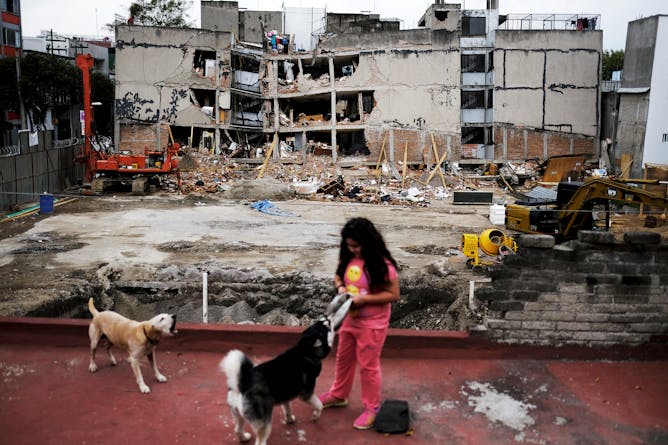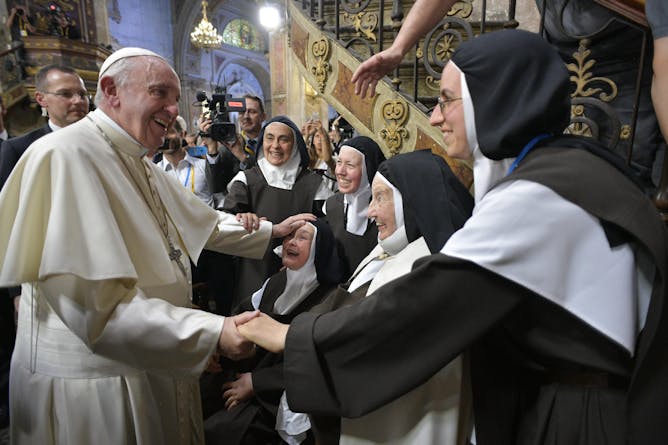| |
|
|
|
|
|
|
| |
|
Editor's note
|
|
People move to cities to live near jobs and other resources, but some urban dwellers are more mobile than others. When community and regional planning scholar Junfeng Jiao analyzed 52 U.S. cities, he found that they all had areas he calls “transit deserts,” where demand for transportation exceeded supply. In his view, better access to transit is a key priority in an urbanizing world.
Ever since an earthquake struck Mexico City in September, killing 300, scientists have been mining data to determine what caused the deadly shock. Yesterday, seismologists Diego Melgar from the University of Oregon and Xyoli Pérez-Campos from the National Autonomous University of Mexico released key new findings: The 7.1-magnitude quake occurred when a bent tectonic plate snapped and broke near the nation’s capital. This type of “bending” earthquake is very rare, they write – but not so rare it couldn’t happen again, perhaps even
closer to the city. (Disponible en español aquí.)
And today, the Catholic Church marks the fifth anniversary of Francis becoming pope. “Since his election,” writes Boise State historian Lisa McClain, “Pope Francis has engaged the estimated 1.2 billion Catholics and innumerable non-Catholics worldwide with his frank, inclusive talk on issues as diverse as poverty and homosexuality.” But there is one thing Francis will not do: support women becoming priests. McClain explains why.
|
Jennifer Weeks
Environment + Energy Editor
|

|
|
Top stories
|

Where’s my bus?
www.shutterstock.com
Junfeng Jiao, University of Texas at Austin; Chris Bischak, University of Texas at Austin
Even in cities with good public transportation, some areas can be 'transit deserts,' where demand exceeds supply. Living in these zones makes it hard to access good jobs, health care and other services.
|

The epicenter of Mexico’s lethal September 2017 earthquake was less than 65 miles outside the nation’s capital.
Nacho Doce/Reuters
Diego Melgar, University of Oregon; Xyoli Pérez-Campos, Universidad Nacional Autónoma de México (UNAM)
Not all earthquakes are made equal. A new study on the 2017 quake that killed 300 in Mexico City finds that both its location and cause were unusual — but seismologists say another strike is possible. Leer en español.
|

Pope Francis will not ordain women to priesthood.
L'Osservatore Romano/Pool Photo Via AP
Lisa McClain, Boise State University
The Catholic Church has historically been unwilling to extend full priesthood to women. However, Pope Francis could take the lead in ordaining women to become deacons, a scholar says.
|
|
|
|
|
Education
|
-
Jack Schneider, College of the Holy Cross
The cycle of overpromising and disappointment has left donors, politicians and policymakers of all stripes looking to improve K-12 public schooling with an underwhelming track record.
-
Dustin R. White, University of Nebraska Omaha; Benjamin Cowan, Washington State University; Jadrian Wooten, Pennsylvania State University
Binge drinking rises during March Madness among male college students who attend schools that made it to the men's basketball tournament. Researchers take a deeper look at the reasons why.
|
|
|
|
|
|
From our international editions
|
-
Andi Wilson, University of Pretoria
Understanding the sex lives of fungi can help in finding answers about disease control.
-
David Blair, University of Western Australia
From a slow hum to a chirp or a bleep, what is that sound you hear whenever there's a new detection of gravitational waves?
-
Christopher Sands, Johns Hopkins University
U.S. President Donald Trump has exempted Canada, for now, from hefty tariffs on steel. An increase in defence spending would likely stand Canada in greater stead with the president.
-
Gervase Phillips, Manchester Metropolitan University
Antisemitic incidents are on the rise across the globe. To understand this modern hatred we need to look into the past and understand its origins.
|
|
|
|
| |
| |
|
|
|
|
|
|
|
|